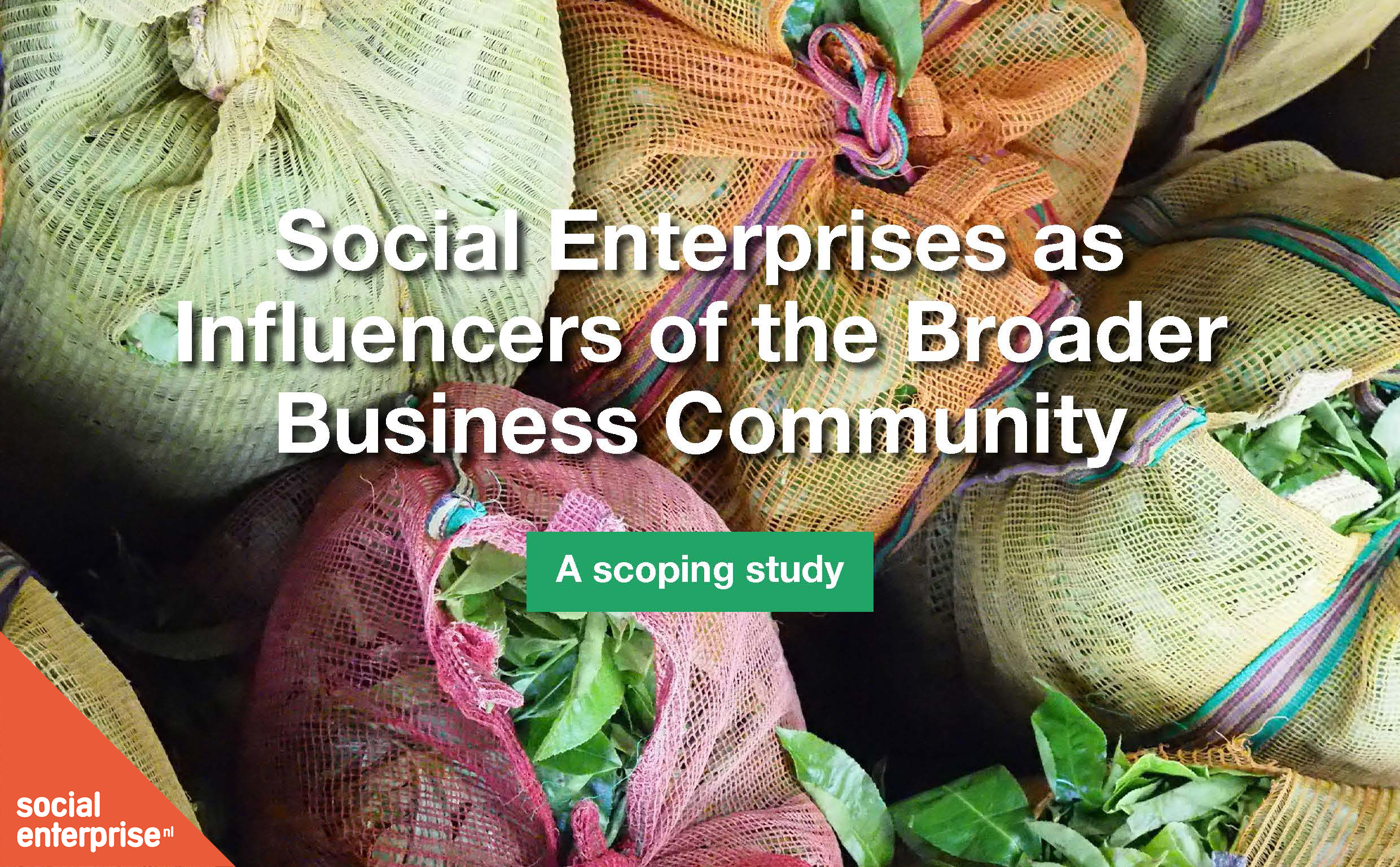Can social enterprises take a leading role in the transition towards a new economy? How do social enterprises influence other companies to act more sustainably? These and more questions are answered in a new research report by Social Enterprise NL: ‘Social Enterprises as Influencers of the Broader Business Community’. The research report: ‘Social Enterprises as…

Publication research report ‘Social Enterprises as Influencers of the Broader Business Community’
Can social enterprises take a leading role in the transition towards a new economy? How do social enterprises influence other companies to act more sustainably? These and more questions are answered in a new research report by Social Enterprise NL: ‘Social Enterprises as Influencers of the Broader Business Community’.
The research report: ‘Social Enterprises as Influencers of the Broader Business Community’.
Influencing wider communities
Social enterprises influence broader business communities, governments, and other actors to move towards a more inclusive and sustainable economy. The global economy needs to undergo a sustainability transition to overcome the social and environmental challenges mankind is facing. The business community as a whole can, and indeed should, play a crucial role in this transition by adopting sustainable business models and practices, both in terms of environmental sustainability and social sustainability.
Small action, big impact
Small niche innovators can trigger and accelerate broad transitions in sociotechnical systems. Transition theory shows that small actors such as social enterprises can play an important role in accelerating transitions by creating ‘niches’ and engaging in system-building activities. Social enterprises can also influence mainstream businesses to enter a niche and influence broader cultural and policy changes that favour sustainable business practices. This may eventually encourage more and more businesses to act more sustainably, changing what is ‘mainstream’ and ‘normal’ in the broader business community: a transition in the making.
Indirect positive force
Social enterprises have the ambition to be a positive force towards a more sustainable economy, far beyond the direct impact they create. The Netherlands Social Enterprise Monitor 2020 showed that 96% of Dutch social enterprises aim to actively influence other organisations to act more sustainable. More and more Dutch social enterprises have set explicit influencing ambitions beyond their direct impact and created specific practices to achieve those goals. Little knowledge exists, however, about the different ways social enterprises try to influence the economy or how effective these are.
Through literature research and case examples, this study reveals this discipline and unlocks the potential of social enterprises when it comes to accelerating a sustainability transition.
See it in action
Social enterprises undertake eleven different influencing activities, grouped in three categories.
1) Raising the possible
Although many companies would prefer to do business in a more sustainable way, it is often hard to imagine how to do business more responsibly. Social enterprises pioneer new products and business models, design ethical value chains, and contribute to knowledge development and technical innovation.
Their pioneering efforts show other companies the possibilities for alternative business realities. This realisation makes it possible for them to tag along. Both new and existing businesses have more reason to enter a new market when a social enterprise has proven that it can work and can make money.
The three activities social enterprises can deploy to ‘raise the possible’ are:
1. Prove sustainable business models,
2. Grow the sustainable market supply,
3. Develop and diffuse knowledge about innovations.
2) Raising the desirable
Norms and values of the main stakeholders (consumers, employees, and investors) have a huge effect on business practices. When the desires of these stakeholders change, they encourage companies to change their practices.
For example, when conscious consumers request sustainable products, businesses adapt to tap the demand. When young talented employees want to work for socially conscious companies, they will question management on their practices. Social enterprises offer opportunities to impact investors, attracting new investors to certain sectors. Clearly, social enterprises can influence the norms and values of all three of these stakeholders through their actions.
The activities social enterprises undertake to ‘raise the desirable’ are:
4. Raise awareness about the problem,
5. Offer consumers an alternative,
6. Advocate sustainable procurement,
7. Inspire people to demand a job with purpose,
8. Support the growing impact of investing.
3) Raising the acceptable
The vast majority of businesses will engage in business practices that are considered ‘acceptable’ by formal institutions, regardless of whether these standards are voluntary or enforced. Some will move to more sustainable practices only when their prior practices are considered unacceptable and, ultimately, when they are deemed illegal. Social enterprises can influence and raise these formal standards.
The activities to ‘raise the acceptable’ are:
9. Raise standards through voluntary industry agreements;
10. Raise standards through certifications and labelling;
11. Fuel a discussion in politics and change government policy.
Strengthening their influence
Social enterprises clearly have a positive influence – but it needs to be strengthened further. Social enterprises have the ambition to influence other organisations and we found a lot of promising examples of doing so. At the same time, we also found barriers that are preventing them from doing so, such as limited resources and lack of competences.
We see huge untapped potential. Therefore, we suggest tangible initiatives to grow their existing influence:
• Build the influencing capacity of social enterprises around the world
– An influencing ’how to’ handbook for social entrepreneurs and capacity- building programs that can be conducted worldwide,
– A Community of Practice for influencers in certain industries and/or regions, complemented with action research1,
– A campaign that highlights best practices for others to follow as an example.
• Facilitate cooperation between social enterprises and corporates
– Develop a program to bring social entrepreneurs and social intrapreneurs together, to inspire and learn from each other.
• Fund systemic change and targeted experimentation
– Impact investors and venture philanthropists can play a key role by allocating dedicated funds towards strengthening the influence of social enterprises. These funds should be combined with action research to ensure that the insights can be shared broadly.
• Accelerate academic research about the influencing role of social enterprises.
– There is still very limited academic research on the indirect impact of social enterprises. We need to spark the discussion within the academic community and start conducting deep case studies.
With these initiatives, we can tap into the full potential of social enterprises. Only then can we make the necessary steps towards a new economy where we reach the Sustainable Development Goals.
